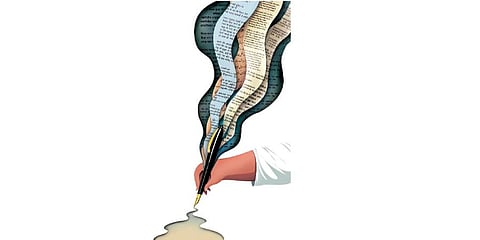

A writer once told me he has a file named ‘Morgue’ in which he tucks away the scoops that got killed by his editor. Many novelists are aware of false starts, where stories that germinate in a feverish mind end up going nowhere. We have all scribbled dementedly after waking up from a deep sleep, only to stare disbelievingly at the gibberish the next morning. Sometimes after painstakingly finishing a first draft and strongly suspecting it to be mediocre, we are loath to delete it, having fallen in love with a phrase here, a line there. Why do we write them and where do they go, this flotsam jetsam verbiage no one wants?
There is no method to writing. Everyone has the same tools: words. To see lines emerge on a blank white paper or a computer screen is exciting as long as they promise to make sense. The first few words are not enough to gauge their future meaning or path despite majestically breaking the monotony of an empty space. Sometimes words flow, spilling over; sometimes words stall, freezing into a jumbled mess or just evaporating on a closer look.
Bestselling writers say they set a daily deadline for the word count; they write this many words before they sleep. It is like going to the office, they say, self-discipline is the key. Yet other writers only sit down to write when the muse strikes them. That’s real literature to them.
Writing does not begin at a keyboard; it happens as you go through life, observing, reacting, concluding, making sense, fantasising, wincing and defending. It is you in totality bringing all of you to the paper, picking and choosing from an interiority what really matters, what lends itself to being prioritised. Whole paragraphs are kept on a ventilator, barely breathing, as you ponder whether to keep them or kill them.
And this is what a large part of writing involves for many writers: garbage garrulousness. Whole lines appear seductively or hint at backstories, only to burst like soap bubbles. To sculpt something out of the solid monolith of alphabets, there’s a lot of chipping off to be done. Characters, subplots, flowery sentences, scenery descriptions, truisms, cliches… all lying dead on the floor. So, what about the wastage? The grandiose reams moaning in saved files to be used another day, fingers crossed, or (as we know deep in our hearts) never again.
We want to get to the actual story, the real thing—but this, alas, is the only route. Wade through all the words flowing out; ruthlessly scythe them down like overgrown grass. Write, read, delete, rewrite. The beauty of bad art is that it is the only way to get to your own deeply personal version of good art.
Shinie Antony
Author
shinieantony@gmail.com